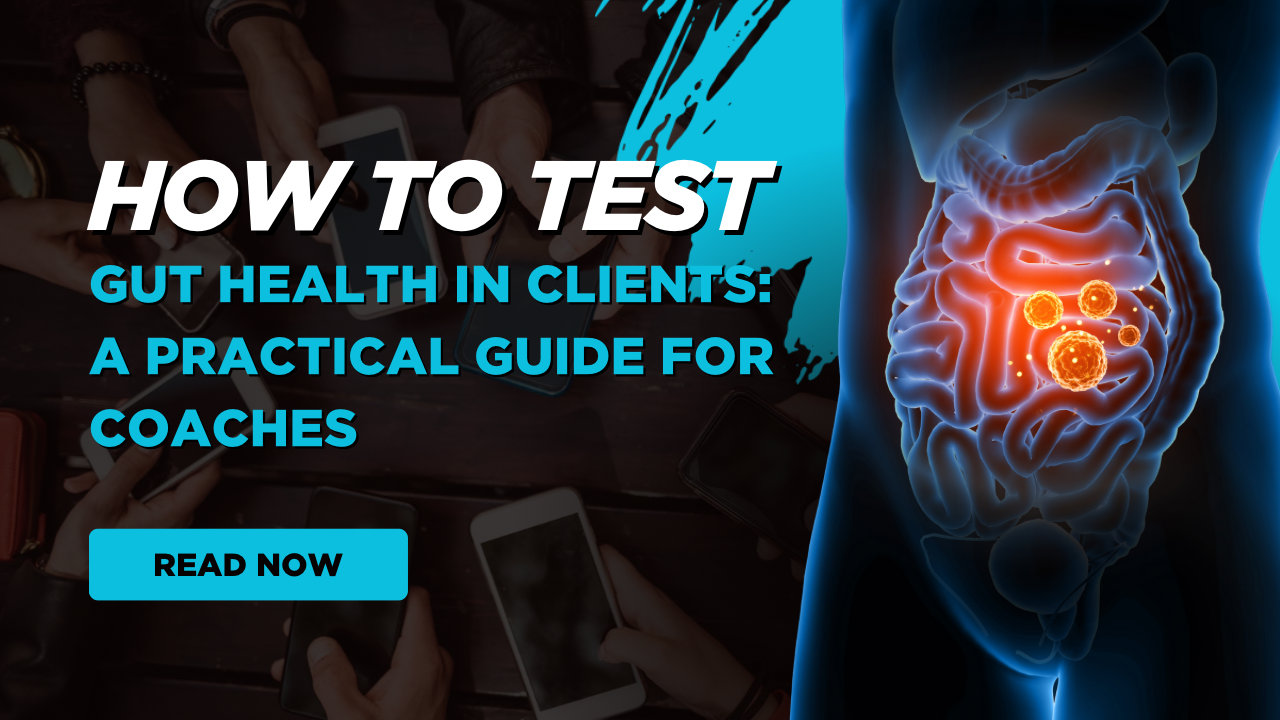How to Test Gut Health in Clients: A Practical Guide for Coaches
Jun 06, 2025
Gut health is more than a buzzword — it’s a foundational pillar of client success, whether you're working with fat loss, performance, or mental clarity. As coaches, we’re often the first line of support for clients dealing with bloating, irregular digestion, skin issues, or fatigue — all signs that the gut may need attention.
You don’t need to be a doctor to help. But you do need a system. Below is a simple, evidence-informed process you can use to assess gut health in your clients and know when to refer out.
Step 1: Start with a Symptom Questionnaire
Before jumping into expensive tests, use a validated symptom screen. Tools like the GSRS (Gastrointestinal Symptom Rating Scale) or a simplified gut symptom checklist (tracking bloating, stool quality, heartburn, flatulence, and frequency) can help spot red flags early.
💡 Pro Tip: Track symptoms weekly alongside training metrics to correlate flare-ups with lifestyle stressors, food intake, or training load.
Reference: Svedlund, J., et al. (1988). Gastrointestinal Symptom Rating Scale (GSRS). Scand J Gastroenterol Suppl.
Step 2: Use the Bristol Stool Chart
Simple, visual, and powerful. Ask your clients: “Which number best represents your bowel movements most days?”
-
Types 3–4 = normal
-
Types 1–2 = constipation
-
Types 5–7 = diarrhea or transit issues
This gives insight into motility and digestion without invasive tools.
Reference: Lewis, S. J., & Heaton, K. W. (1997). Bristol Stool Form Scale. Scandinavian Journal of Gastroenterology.
Step 3: Diet & Fiber Intake Review
Look for:
-
Low fiber (<20g/day)
-
High intake of irritants (alcohol, caffeine, spicy food)
-
Artificial sweeteners or gums
-
Low diversity in fruits, vegetables, fermented foods
Encourage a minimum of 25–30g of mixed fiber and 7–10 different plant foods per week to support microbial diversity.
Reference: Sonnenburg, E. D., & Sonnenburg, J. L. (2019). Starving our microbial self: The deleterious consequences of a diet deficient in microbiota-accessible carbohydrates. Cell Metabolism.
Step 4: Stress, Sleep, and Bowel Patterns
The gut-brain axis plays a major role in gut dysfunction. Use simple questions to screen:
-
Are you waking unrefreshed?
-
Do you get urgent bathroom trips when anxious?
-
Do you feel worse after high-stress days?
Track HRV, sleep quality, and timing of symptoms relative to stress events.
Reference: Foster, J. A., & McVey Neufeld, K. A. (2013). Gut–brain axis: how the microbiome influences anxiety and depression. Trends in Neurosciences.
Step 5: Functional Testing (When Necessary)
If symptoms persist after basic interventions, consider:
-
Comprehensive Stool Analysis (e.g., GI-MAP, CDSA) to assess:
-
Dysbiosis
-
Pathogens
-
Inflammation markers (calprotectin, zonulin)
-
-
SIBO Breath Testing for unexplained bloating or IBS-type symptoms
-
Organic Acids Testing (OAT) to look at microbial metabolites and yeast overgrowth
⚠️ Always pair testing with practitioner referral. As a coach, your role is to identify, refer, and support — not to diagnose.
Reference: Rezaie, A., et al. (2017). Hydrogen and methane-based breath testing in gastrointestinal disorders: The North American Consensus. The American Journal of Gastroenterology.
Final Thoughts
You don’t need to be a gut health expert — but you do need a process.
✅ Use symptom screens
✅ Monitor stools and digestion patterns
✅ Improve fiber and food variety
✅ Triage based on lifestyle and stress
✅ Refer out when red flags persist
This approach keeps you within your scope and makes you the most valuable coach your client has ever worked with.
Want to Learn More?
Ascend Education’s Functional Health Toolkit for Coaches walks you through how to:
-
Interpret basic gut health tests
-
Build food-based support plans
-
Create referral systems that elevate your coaching practice
🔗 [Get the Toolkit] (CTA Placeholder)
